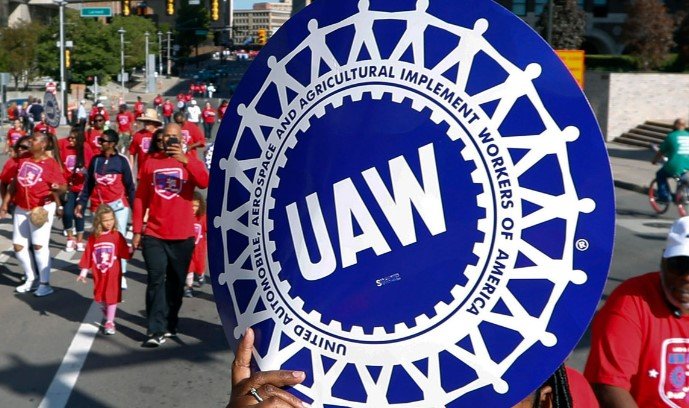The United Auto Workers union is preparing for a possible strike against Ford and GM as contract negotiations with the two automakers have reached a deadlock. The union, which represents about 146,000 workers at the Big Three US carmakers, is seeking more than 40% pay raises over four years, restoration of pensions for newer hires, cost-of-living increases, an end to wage tiers, and other benefits.

UAW president warns of strike readiness
In a Facebook Live address on Tuesday, UAW President Shawn Fain said the union is in a strong position to make major gains in talks with Ford, GM and Stellantis. He said the union has a healthy strike fund and a plan for a work stoppage if necessary. He also accused Stellantis of seeking concessions in contract talks when the union wants gains. He angrily tossed a copy of the Stellantis proposal in a trash can, saying it was “a slap in the face” and “spit in our faces”.
Fain said the union is not satisfied with the offers from Ford and GM either, and that the clock is ticking for a deal before the current contracts expire on Sept. 14. He said the union is ready to strike one or more of the companies if they do not meet their demands.
Automakers push back on UAW demands
The automakers have argued that the UAW’s demands are unrealistic and would threaten their competitiveness and profitability. They have cited the challenges of the industry’s transition to electric vehicles, which require fewer parts and workers than internal combustion engines. They have also pointed to the rising costs of health care, pensions and other benefits for their employees.
Ford said in a statement that it is committed to reaching a fair and balanced agreement that recognizes the contributions of its UAW-represented workforce and enables it to invest in its future. GM said in a statement that the UAW’s demands would “threaten our ability to do what’s right for the long-term benefit of the team.” Stellantis did not comment on its proposal, but said earlier that it is not seeking a concessionary agreement.
UAW faces internal challenges amid corruption scandal
The UAW’s bargaining power may also be affected by its own internal challenges, as it faces a federal corruption probe that has resulted in charges against several former union officials and executives. The investigation has exposed a culture of bribery, embezzlement and fraud within the union, which has eroded the trust and confidence of its members.
The UAW has agreed to hold a referendum among its members on whether to adopt direct voting for its top leaders, instead of the current system of delegates. The referendum is expected to take place next year, after the contract talks are concluded. Some members have called for more transparency and accountability from the union leadership, as well as more democracy and participation in decision-making.
